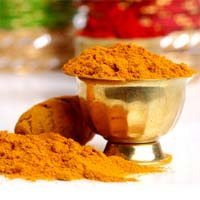Is it Time for a Curcumin-Based Mesothelioma Treatment?
 Yet another scientific study appears to confirm the power of the spice-derived compound curcumin as a weapon against malignant pleural mesothelioma.
Yet another scientific study appears to confirm the power of the spice-derived compound curcumin as a weapon against malignant pleural mesothelioma.
The Chinese researchers who conducted the latest study say the substance has the potential to be the basis of a whole new way of treating this aggressive asbestos cancer.
This team tested curcumin on a line of mouse mesothelioma cells, both in the lab and in live animals, and published their promising results in the prestigious International Journal of Oncology.
Curcumin’s Impact on Mesothelioma Cells
Curumin is a primary chemical in turmeric, responsible for the root’s spicy flavor and characteristic yellow hue. If turmeric does, in fact, help fight cancer, as so many health food stores and supplement makers claim, it is likely because of its curcumin content.
As a plant polyphenol, curcumin has powerful anti-inflammatory and antioxidant properties and has been the subject of numerous mesothelioma studies around the world in just the last three years.
Curcumin appears to work in several ways, including disrupting mesothelioma cell DNA, inducing programmed cell death, and preventing the formation of a tumor-supporting blood supply (angiogenesis). Just as importantly — and in sharp contrast to other types of mesothelioma treatments — curcumin has very low toxicity.
Testing Curcumin as a Mesothelioma Treatment
In the current study, Chinese researchers used a variety of sophisticated testing tools to assess the impact of curcumin on a mouse mesothelioma cell line. They applied the compound to cells in the lab and in mesothelioma tumors implanted under the skin of live mice.
They found that curcumin exerted a range damaging effects on the mesothelioma cells including:
- Disruption of vital signaling pathways
- Induction of apoptosis
- Inhibition of blood vessel formation
- Prevention of proliferation signals
The results prompted lead author Chengke Zhang of the Department of Thoracic Surgery at The Second Hospital of Shandong University to conclude, “Curcumin may be potent enough to be developed as a novel therapeutic agent for the treatment of malignant pleural mesothelioma.”
Curcumin Emerging as an Alternative Mesothelioma Treatment
A number of previous studies have also suggested that curcumin has merit as an alternative therapy for mesothelioma.
A study conducted last year at the University of Rome found that mice infected with peritoneal mesothelioma lived longer when they were given curcumin. A few months later, French researchers used curcumin to shrink sarcomatoid tumors in lab rats.
In 2015, researchers in Australia conducted the first experiments of curcumin on human mesothelioma cells and concluded that the compound could be a helpful supplement to standard treatment for certain mesothelioma patients.
In another 2015 study, Italian researchers found that curcumin was even more effective against mesothelioma when delivered into cells via nanoparticles which overcame cells’ natural resistance to the compound.
Curcumin is of particular interest to mesothelioma researchers because there are so few viable treatment options for this deadly cancer.
Sources:
Zhang, C, et al, “Curcumin induces apoptosis and inhibits angiogenesis in murine malignant mesothelioma”, September 21, 2018, International Journal of Oncology, Epub ahead of print, https://www.spandidos-publications.com/10.3892/ijo.2018.4569
Pouliquen, DL, “Evaluation of intracavitary administration of curcumin for the treatment of sarcomatoid mesothelioma”, Oncotarget, August 22, 2017, eCollection
Van Santen, J, “Spicy treatment for aggressive cancer”, Southern Health News, Flinders Medical Center Publication, June 2015





